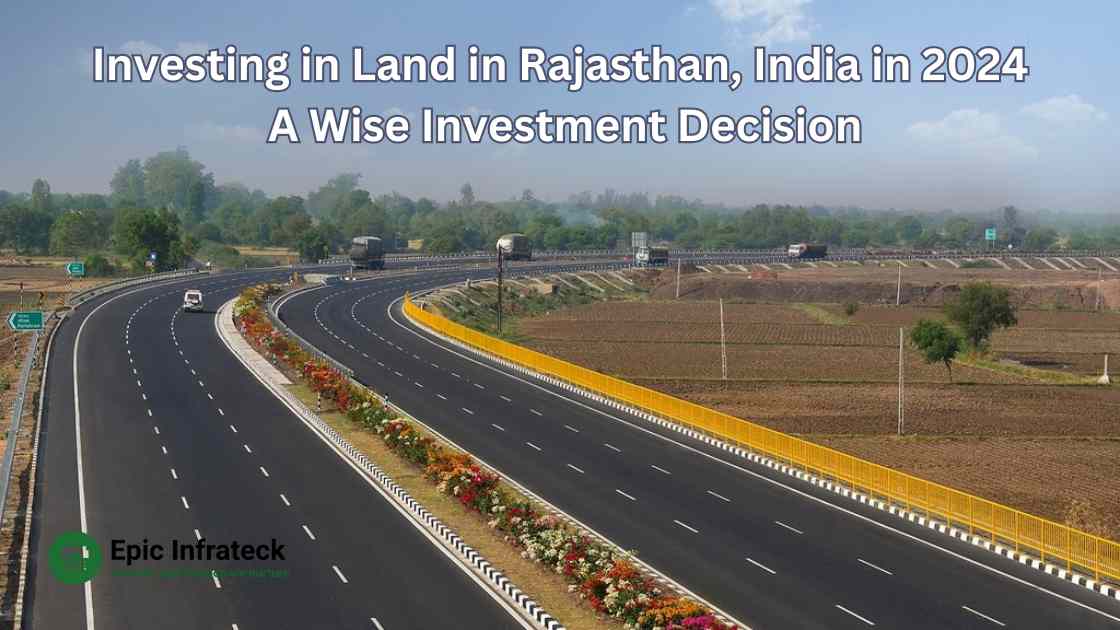Investing is a crucial aspect of financial planning, and choosing the right investment options can have a significant impact on long-term wealth creation. Among the various investment options available, investing in land in India, specifically in Rajasthan, in 2024 is a wise decision due to several factors. This article will explore these factors and compare land investment with other investment options to demonstrate why investing in land in India in 2024 is a prudent choice.
I. Economic Growth and Stability:
India, as one of the world’s fastest-growing economies, offers numerous investment opportunities. The country’s economic growth and stability have a positive impact on the real estate sector, including land prices. Rajasthan, known for its rich cultural heritage and historical sites, has witnessed remarkable growth potential in recent years. With industries such as tourism, agriculture, and manufacturing thriving in the state, the economic stability and growth potential of Rajasthan make it an attractive destination for land investments.
II. Population Growth and Urbanization:
India’s population is growing at a rapid pace, leading to increased urbanization. This has resulted in a higher demand for residential, commercial, and industrial spaces. Rajasthan, with its unique natural landscapes and cultural attractions, attracts a significant number of tourists and migrants. The increasing population and urbanization further drive the demand for land in the state, creating a favorable investment climate.
III. Infrastructure Development:
The Indian government has been actively developing the country’s infrastructure, including roads, airports, and industrial corridors. Rajasthan is a significant part of the Delhi-Mumbai Industrial Corridor (DMIC), a planned infrastructure project aimed at boosting industrial activity, creating employment opportunities, and enhancing connectivity. Such infrastructure development not only increases the overall value of land in Rajasthan but also promotes industrial and commercial growth, making it an ideal location for investment.
IV. Growing Tourism Industry:
Rajasthan is globally renowned for its rich cultural heritage, palaces, forts, and vibrant festivals. The state’s tourism industry has been flourishing, attracting both domestic and international tourists. With the government’s continued focus on promoting tourism and developing infrastructure to facilitate travel, the sector is expected to witness sustained growth. Investing in land for tourism-related activities, such as hotels, resorts, and homestays, can provide lucrative returns in Rajasthan.
V. Government Initiatives and Incentives:
The government of India and the state governments have introduced several initiatives and policies to encourage investments in the real estate sector. These include subsidies, tax exemptions, simplified approval processes, and favorable land acquisition policies. Rajasthan, in particular, has implemented investor-friendly policies that enhance the ease of doing business and create a conducive environment for investors. These government incentives make investing in land in Rajasthan an attractive proposition for both local and non-resident investors.
VI. Comparisons with Other Investment Options:
While there are numerous investment options available, investing in land offers unique advantages over traditional investment avenues. By comparing land investment with other popular investment options, we can further understand why investing in land in India, specifically in Rajasthan, is a wise decision in 2024.
a) Stocks and Bonds:
Stocks and bonds are common investment options, but they come with inherent risks. The stock market is volatile, and bond yields may not always offer attractive returns. Land investment, on the other hand, provides tangible assets with the potential for appreciation over time. Land prices tend to rise over the long term, acting as a hedge against inflation and offering stability to investors.
b) Mutual Funds and ETFs:
Mutual funds and exchange-traded funds (ETFs) are popular investment vehicles that offer diversification. While they provide exposure to a basket of assets, including stocks and bonds, they are dependent on market conditions. Investing in land provides an additional layer of diversification, reducing overall investment risk. Land is a non-correlated asset that can perform well even during market downturns.
c) Gold and Precious Metals:
Gold and precious metals are considered safe-haven assets, but their prices can be subject to volatility. Investing in land is a tangible asset with intrinsic value and utility. Land can generate income through rentals, be developed for various purposes, or sold at a higher price in the future. Unlike gold, which has limited applications, land provides a wide range of investment opportunities.
d) Real Estate and Rental Properties:
Real estate investments, including residential and commercial properties, are popular choices. However, they require substantial capital and involve management responsibilities. Investing in land, especially in emerging areas like Rajasthan, can offer higher potential returns with lower upfront costs. Additionally, land investments do not involve the complexities of property management and tenant issues.
Conclusion:
Investing in land in India, specifically in Rajasthan, in 2024 is a wise decision due to factors such as economic growth, population growth and urbanization, infrastructure development, the growing tourism industry, government initiatives and incentives, and the unique advantages it offers compared to other investment options. Land investment provides an opportunity to benefit from the economic growth of a rapidly developing country. However, it is crucial to conduct thorough research, seek professional guidance, and consider various factors such as market conditions, legal frameworks, and environmental aspects before making any investment decisions. By doing so, investors can maximize the potential returns and mitigate risks associated with land investments.





